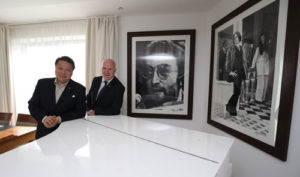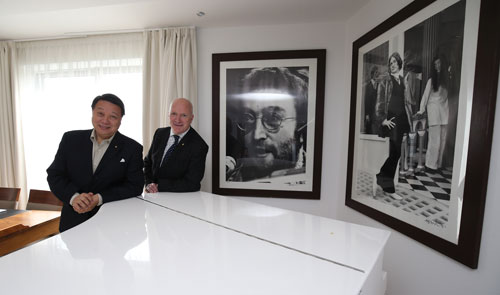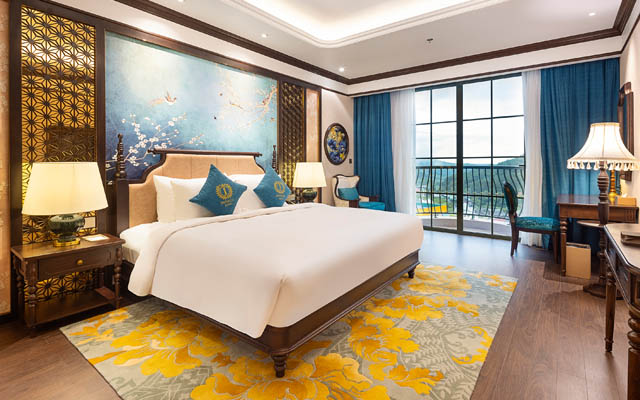A small hotel buy can translate into something bigger. Raini Hamdi reports from Liverpool, where Millennium & Copthorne (M&C)’s acquisition of the world’s only Beatles-inspired hotel has been completed

The price of £13.8 million (US$21 million) which M&C paid for the Hard Days Night Hotel (HDNH) in Liverpool is seen as ‘small change’ for its executive chairman Kwek Leng Beng, but expectations of the value the hotel can bring to M&C, and to Liverpool, are not as puny.
The chain believes the hotel can be even more profitable but, more than that, it has gained a unique marketing instrument that it can use to drum up awareness of its 24 hotels in Britain and Europe. And Imagine, in the future there could be other HDNHs in places where The Beatles has a following. That’s practically everywhere.
Aloysius Lee, CEO of M&C, is already toying with two travel trade functions in New York and Singapore hinging on HDNH to promote M&C hotels. He is also persuading Asian tour operators to launch a London and Liverpool itinerary. The drive between the two cities is a long three hours, but the pain can be lessened for Asian clients especially with a stop at the Bicester Designer Outlet Village located halfway through the journey, he said.
Lee needs the international market to fill the hotel during weekdays, when occupancy languishes, while weekends are a full house thanks to the domestic market.
Liverpool’s Lord Mayor, Tony Conception, hopes M&C will be successful in bringing more Asian visitors to Liverpool. The city has shed its poor image and has been regenerating itself since 2008, when it was conferred the European Capital of Culture status, he said.
A £1 billion shopping mall, One Liverpool, has opened. So has an exhibition centre on the waterfront with a capacity for 6,000 pax. Next door are a convention centre and a concert arena. Hotel roomcount has tripled to 7,700 today, from 2,300 in 2008. A partnership among the City Council, police and emergency services to keep the city centre and the night-time economy safe has helped Liverpool earn a Citysafe certification by an independent body year after year, said Conception.
Things are looking up or, as Lee put it, “are coming to a tipping point” for Liverpool, part of a region George Osborne called the “Northern Powerhouse”. The Chancellor, in China recently, opened a pitch book on more than £24 billion of investment opportunities in the region.
And Liverpool can do with continued growth. The City Council has racked up a debt of some £20 million from the reconstruction since 2008 while unemployment rates are still high, City of Liverpool statistics show.
Come together
An estimated 600,000 people each year visit Liverpool to retrace the footsteps of the Fab Four: John Lennon, Paul McCartney, George Harrison and Ringo Starr. They go to Beatles Story, the world’s largest permanent exhibition devoted to the lives and times of The Beatles; on a Magical Mystery Tour in a psychedelic bus that stops at world-famous Beatles sites from Penny Lane to Strawberry Field; to the Cavern Club where The Beatles had played nearly 300 times; to the International Beatleweek Festival, the biggest Come Together in the world featuring over 200 bands from across the globe.
Said Dave Jones, owner of the Cavern Club: “It was obvious to me back in the 80s, when tourism was first included in the economic planning, that Liverpool’s USP was Beatles by a mile, followed by sports, beautiful buildings, museums, maritime history, etc. But people weren’t going to come just to look at buildings; there had to be something global, and which no other city could claim birthrights to. For me, it’s a no-brainer: why waste time selling cathedrals when you’ve got brand Beatles?”
Strangely though, no one had thought to come up with a Beatles-themed hotel until Tony Criss, who acquired the lease on a heritage building next to the Cavern Club in 2006, developed HDNH from scratch and opened the hotel in 2008. Criss put it up in the market last March; it was speculated Marriott’s Autograph Collection was in talks with him in 2013 but nothing came of it. One look at the hotel and Kwek was sold, closing the deal in under two hours and paying more than the reported asking price of £11 million for the 113 years left on the hotel’s lease.
Fundamentally, HDNH is a stylish design hotel that looks brand new and has the wherewithals to please the modern leisure and business traveller. It rests easily in the lifestyle category – the current rage of hotel chains which are scared to lose out on the New Gen. A night’s stay shows it is neither a tacky theme hotel nor a Beatles museum hotel that takes itself too seriously. On the contrary, it gives the sense it is paying homage to a legend in subtle, creative ways and, being in the birthplace of The Beatles, achieves a sense of place that many hotels can only dream about.
“When we opened, we called ourselves a Beatles-themed hotel and that was a mistake. People think theme hotels are tacky; trying to convince them we’re a serious hotel is a challenge. That’s why we call ourselves a Beatles-inspired hotel,” said general manager Michael Dewey. “No matter how much you tell them how stylish it is, they’ve got to cross the threshold to believe it.”
In the seven years of operation, many did. “We compete with other brands such as Hilton and Crowne Plaza and outperformed them on all three measures, not that often on occupancies but always on rates and RevPAR. And we did that as an independent, i.e., without M&C, and without affiliations or alliances, but with brand Beatles,” said Dewey, who claimed an AOR of 78 per cent and an ARR of £89 in a year, 80 per cent leisure and 20 per cent corporate.
The city’s AOR rose to 75.5 per cent last year from 71.2 per cent in 2013, while RevPAR rose to £46.33 in 2014 from £41 in 2013.
Americans are HDNH’s biggest foreign market, and there is a sprinkling of Asian customers. Visit Liverpool data shows 62 per cent of visitors are domestic and 38 per cent are international, mainly from Ireland, Spain, Australia, America and France. While Liverpool continues to see growth in domestic arrivals and visitors from France and America, those from Japan, Ireland, Spain and Germany are continuing to decline. The smaller Asian markets such as the Philippines, Indonesia and Hong Kong are also on a decline.
The entry of an international chain with Asian roots is akin to Here Comes the Sun for HDNH and Liverpool.
Said Dewey: “My market is everywhere, as everywhere in the world there are Beatles fans. But as an independent, we don’t have loads of money. And that’s why M&C suddenly gives us an international platform. I can’t see us doing anything but grow from strength to strength. We will be the busiest hotel, and there will be an increase in international customers.”
The big question, however, is whether The Beatles continues to resonate with younger travellers. Dewey said: “If you’re a Beatles fan, you’re 65 years old plus, easily. But the generation span that loves the songs ranges from 12 years old to … old. Just take the Magical Mystery Tour and you’ll see how extraordinary the age span is.”
Julia Baird, John Lennon’s sister, told TTG Asia: “It’s less and less about The Beatles per se, or each individual in it. It’s more and more about the music. Why do people study Beethoven? Because the music is wonderful and it transcends geographic boundaries – many Chinese are studying it and are excellent at it. Beatles is going that way. The music lives on.”
As for what she would hope M&C would do with HDNH, Baird said: “Not change things too much. Not put the Millennium stamp on it. That would be a mistake. It is its own brand. You’ve got a format here and it really works, you wouldn’t have bought it if it didn’t.
“May be you could repeat it in New York, Tokyo, Shanghai or Beijing but don’t change it. I’m sure there’s a market for this everywhere.” In other words, Let It Be.
This article was first published in TTG Asia, October 16, 2015 issue, on page ,4. To read more, please view our digital edition or click here to subscribe.


















